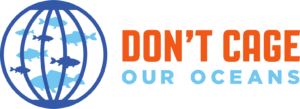At issue is whether Cooke Aquaculture, a Canadian farmed salmon company with a poor track record of environmental stewardship and social responsibility, should be granted a permit to transship farmed salmon from the state of Maine to Canada (for processing), using Canadian-flagged vessels. NMFS has published this opportunity for public review and to comment on this proposal. The application for a transshipment permit is submitted under provisions of the Magnuson-Stevens Fishery Conservation and Management Act (MSA).
The Transboundary Permit Request Should be Rejected
Our national members and Maine-based members, such as Fish & Whistle, Greenhorns, and One Fish Foundation, agree that offshore fish farming is an antiquated practice that we should not be emulating in this country. Globally, leading countries are actively pulling away from this practice either by banning it outright or heavily taxing the practice (e.g., Canada (British Columbia), Denmark, Argentina, and even Norway). They are doing so because of the enormous ecological harms caused by allowing these corporations to proliferate and expand operations in their countries’ waters for years.
Therefore, the harmful practice itself, added with the job loss impact of removing U.S. citizens from the opportunity to either transport or process the farmed fish, is against the interest of the United States, thereby failing the first part – Section 204(d)(3)(A) – of the four criteria laid out in MSA Section 204(d)(3). It is also against the agency’s own policy in its National Seafood Strategy (Goal 4). For these reasons, the National Marine Fisheries Service should not grant the permit to transship farmed salmon across national borders with foreign vessels for offshore processing.
Read DCO2’s full comments.
